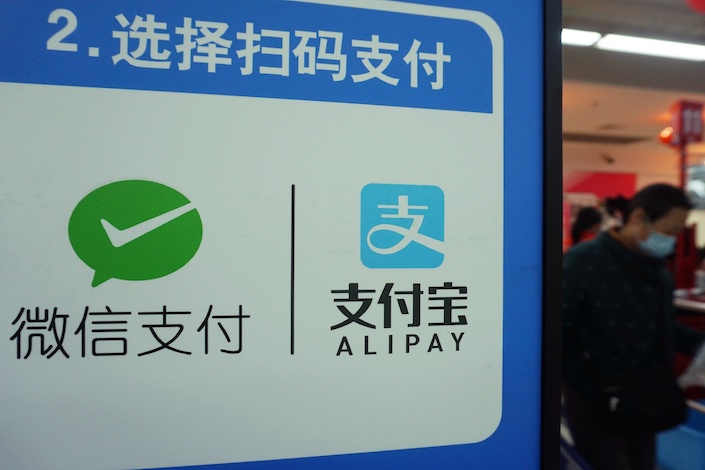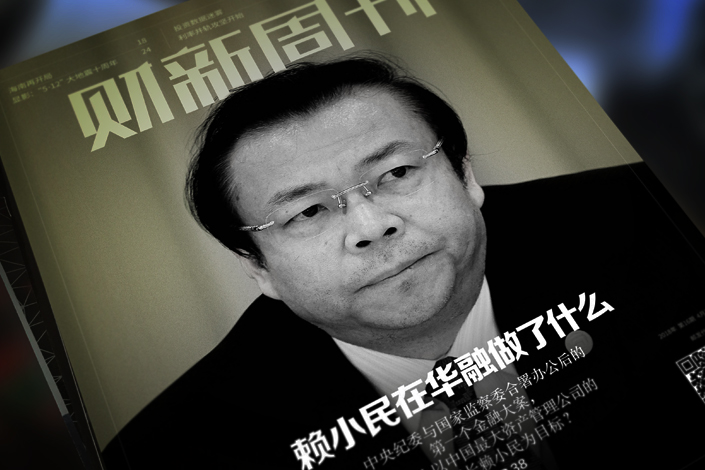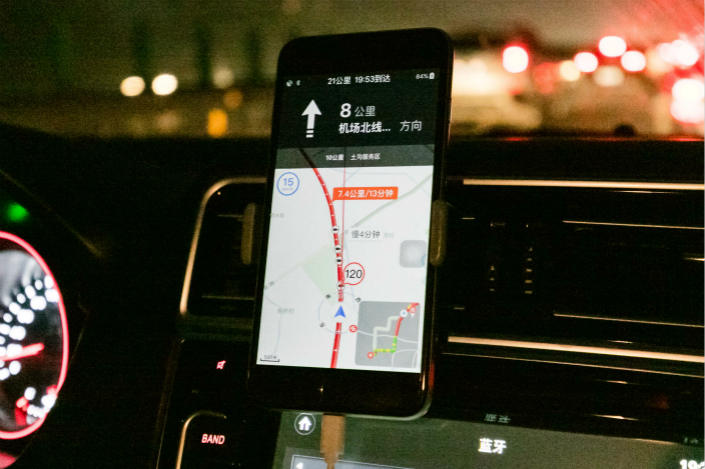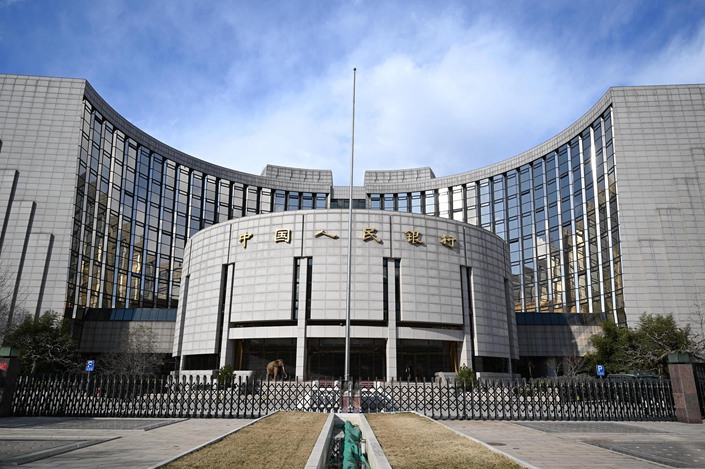ABOUT US
CX Tech is Caixin Global's real-time tech news portal, featuring 24-hour news, short-form analysis, and roundups from business and tech media in China.
- LATEST
- Daily Tech Roundup: ByteDance Sues U.S. Over TikTok Ban, Tesla’s China Sales Slump
- Daily Tech Roundup: Chinese Wind-Turbine Makers’ Global Dominance, France Ramps Up EV Ambitions
- Daily Tech Roundup: China’s Robot-Makers Tap AI Power, Zeekr Plans $368 Million IPO
- Daily Tech Roundup: Fatal Crash Mars Huawei’s EV Efforts, Binance Founder Gets Four Months in Prison
- Daily Tech Roundup: Tesla’s Advanced Self-Driving Tech in China, AI Startups Lead Unicorn Herd
- Update: Four Things to Know About Tesla’s Advanced Self-Driving Tech in China
- Daily Tech Roundup: China Offers Subsidies for Car Trade-Ins, Shein Faces Tougher Digital Rules in EU
- Daily Tech Roundup: Xiaomi Sees Annual Car Deliveries Hitting 100,000, Geely Auto’s Comeback Gets Into Gear
- Battery Giant CATL’s Newest Pack Can Power Cars Even Further
- Daily Tech Roundup: Huawei Smartphone Shipments Surge, China Limits Facial Recognition at Hotel Check-In
- Daily Tech Roundup: TikTok Faces Hurdles to Becoming No. 1 in E-Commerce in Vietnam, Huawei Launches Upgraded SUV
- Daily Tech Roundup: Musk Hints Full Self-Driving Teslas on the Way in China
- Daily Tech Roundup: U.S. Lawmakers Seek Sanctions on Chinese Carmakers, CATL Founder Upbeat About Ford Battery Plant
- Daily Tech Roundup: TikTok Faces U.S. Reckoning, Huawei Unveils New Smartphone
- Daily Tech Roundup: Alibaba Doubles Down Overseas, VW Debuts China EV Software
- Hytera Communications Resume Global Sales After U.S. Court Lifts Ban
- Daily Tech Roundup: Alibaba’s Plans for Ele.me, AI Model Developers’ Watershed Moment
- Daily Tech Roundup: Li Auto Dispels Rumors of Exclusive Uzbekistan Sales Network, Clamp Down on Russia Exports
- Daily Tech Roundup: China Pursues Next-Gen Nuclear Power
- U.S. Blacklists Six More Chinese Firms for Acquiring AI Chips for Military and Drones for Russia
It’s hard to imagine living in China today without Alipay (支付宝) and WeChat Pay (微信支付). From small beginnings providing payment systems for online shopping transactions, WeChat Pay and Alipay have become the goliaths of China’s payment industry and have spread their tentacles into just about everything, even digitizing the Lunar New Year tradition of giving cash-filled red packets.
But these closed ecosystems have become an increasing worry to China’s regulators not only because their market power has the potential to snuff out competitors and encourage monopolistic behavior, but also because of the potential risks they could bring to the financial system.
Now, after a decade-long virtually unfettered boom, Alipay and WeChat Pay face sweeping regulatory changes to crimp their dominance, build a more level playing field for competitors and control potential risks.
But the rules aren’t just aimed at these two players. They aim to tighten oversight of all nonbank institutions operating in the payments sector, as the People’s Bank of China explained in a statement that accompanied the release of a draft of the “Regulations on Nonbank Payment Institutions” (link in Chinese) on Jan. 20. The draft, if approved, gives the government and regulators new powers to fight monopolies and rein in dominant players, even going so far as forcing them to divest some of their businesses.
Read the full story here.
Contact reporter Timmy Shen (hongmingshen@caixin.com)
Support quality journalism in China. Subscribe to Caixin Global starting at $0.99.
A Chinese court has sentenced a former top financial official to death after he was found guilty of bribery, bigamy, and embezzlement
Lai Xiaomin, a former chairman of one of China’s four largest state-owned bad-debt managers, was sentenced to death on Tuesday by a court in North China’s Tianjin municipality, according to a court statement (link in Chinese).
Lai was found guilty of receiving or attempting to receive a record 1.79 billion yuan ($276.8 million) of bribes over a 10-year period from 2008 to 2018. He was also convicted of bigamy and colluding with others to embezzle 25.1 million yuan of public funds.
Lai’s case made headline not only due to the size of the crime but also due to some of the astonishing details that emerged during the investigation, such as the metric tons of cash stashed at his home, the 300 million yuan bank account under his mother’s name, and his over 100 mistresses.
As well as passing the death penalty, the court deprived the former China Huarong Asset Management Co. Ltd. chairman of his of political rights for life and confiscated of all of his personal property.
Read more here
Contact reporter Guo Yingzhe (yingzheguo@caixin.com) and editor Joshua Dummer (joshuadummer@caixin.com)
In the first nine months of 2020, Chinese police cracked down on 1,700 online gambling platforms and 1,400 underground banks involving more than 1 trillion yuan ($153 billion) of illegal transactions, data from the Ministry of Public Security showed. That compared with 7,200 online gambling cases in 2019 totaling 18 billion yuan.
The increase in cases comes as Chinese authorities launched a nationwide “Card Breaking Campaign,” an operation to crack down on illicit bank card transactions and bank card sales to combat telecommunications fraud and cross-border online gambling. The campaign aims to cut off links between mobile phone sim cards and bank cards, and users who are not the registered card holders. Also included are online payment accounts such as Tencent’s WeChat Pay and Alibaba’s Alipay.
This new type of crime has created an illegitimate industry employing 5 million to 6 million people involving information technology (IT), payment settlements and operations, according to an IT department official at the Ministry of Public Security. The complex payments and money laundering system ropes in small individual players in some of China’s remotest places like the migrant worker in Baoding who loan or lease financial credentials to offshore criminal groups, which then help illegal gamblers hide money from authorities, often using Tether Ltd.’s USDT cryptocurrency.
Read the full story here
Contact reporter Denise Jia (huijuanjia@caixin.com) and editor Marcus Ryder (marcusryder@caixin.com)
Chinese livestreaming companies will be forced to cap the amount of money viewers can spend on their favourite performers as part of new rules unveiled by the national media regulator this week, potentially eating into a lucrative source of revenue for the firms.
The rules call on streaming sites to set maximum values for single donations and also cap each user’s daily and monthly spending, which platforms take a cut of.
The new directive also tells platforms to verify the age and real identities of live-streamers and those who patronize them.
People found to be under the age of 18 will not be able to send virtual gifts or give tips, the regulator said in the notice published Monday, which followed reports of underage users spending excessive amounts of money on such platforms.
Read the full story here.
Contact editor Marcus Ryder (marcusryder@caixin.com)
An intellectual property court has ordered search giant Baidu to pay a fine of 64.5 million ($9.82 million) by the end of the week for continuing to use another company’s digital maps after the licensing contract expired.
Baidu said it would appeal the judgment and claimed that it did not infringe the copyright of navigation software developer NavInfo, and is counter-suing the company for violating the copyright of its own Baidu Map.
Its defence came unstuck due to over 200 pieces of “flawed information” that NavInfo inserted in its original maps as a kind of digital watermark, showing things like oddly- shaped water features and roads leading to nowhere.
Read the full story here.
Contact editor Marcus Ryder (marcusryder@caixin.com)
A tech hub in eastern China could become the first place in the country to issue an explicit ban on facial recognition technology.
Hangzhou, a city of 10 million people that is home to e-commerce giant Alibaba Group Holding Ltd., will consider a revised draft of municipal property management regulations that would make it illegal to demand that people submit to facial and other biometric scans when entering residential compounds.
The upcoming deliberations are a sign that widespread public angst in China about the potentially intrusive public use of facial recognition technologies is starting to inform government policy.
It comes after national legislators blasted a draft Personal Data Protection Law earlier this month for not clarifying how facial recognition should be used in public; what roles the government should play in controlling such technologies; and who is legally accountable for data leaks.
Get the full story here (with no face scan required).
Contact reporter Matthew Walsh (matthewwalsh@caixin.com)
Browsers operated by some of China’s biggest internet names were caught up in a crackdown by the cyberspace regulator, which requested them to be swept clean of “rumor-mongering,” “sensational headlines” and material that violates the “core values of socialism” by Nov. 9.
The initial targets of the campaign are browsers operated by Huawei Technologies, Alibaba Group Holding’s UCWeb, Xiaomi Corp., Tencent’s QQ, Qihoo-owned 360, Oppo and Sogou. The Cyberspace Administration of China’s campaign has become a topic of huge interest on social media, attracting millions of views and comments on Weibo.
Most mobile phone manufacturers have expanded beyond hardware to capitalize on powerful user bases for software. Built-in phone browsers have become an important point of contact, which has led producers to launch streaming services to further interact with their customers.
According to the CAC, browsers gather and amplify the dissemination of chaos by “self-media,” which have been accused of publishing news in violation of regulations, pushing information via pop-up windows, giving stories gimmicky titles, hyping up sensitive topics, making up information, rehashing old news, and posting vulgar and negative material.
An investigation by Southern Metropolis Daily in July 2019 into 10 popular mobile browsers revealed that advertising content was “a minefield of false information,” and readers were regularly diverted to online lending platforms and gambling sites. Pornographic content was regularly displayed in pop-up windows, a source of social media users’ complaints when learning of the latest crackdown. One popular comment on Weibo was, “Why wasn’t Baidu on the list?”
By Tuesday, Huawei, Xiaomi, Oppo, and Vivo had issued self-inspection and rectification announcements on their homepages.
Editor: Marcus Ryder (marcusryder@caixin.com)
Related: China’s New Cyber Rules Tells Website Operators to Showcase Politically Acceptable Content
Located in a border town in Myanmar, the Yatai City project is falsely described as an industrial and entertainment complex under China’s Belt and Road initiative
A Caixin investigation examining court papers and public documents has uncovered the shady business history of a high-profile investment project in Myanmar was backed by a reclusive Chinese businessman who has done business under at least four names and has faced allegations of being connected to illegal gambling operations.
At the center of the controversy is an ambitious $15 billion project called Yatai City that aims to turn a quiet Myanmar border village into a Singapore-like business hub, according to public information. The main architect of what’s also known as the Myanmar Yatai Shwe Kokko Special Economic Zone is a 38-year-old expatriate Chinese businessman who goes by the name She Kailun and three others, based on Caixin reporting.
His Yatai City is a massive commercial project located in a small town on the Moei River in Kayin State, bordering Thailand. Developed by Hong Kong-registered Yatai International since 2017, the project is planned to cover 12,000 hectares. Yatai City is billed as an industrial and entertainment complex that will accommodate a vast range of services including tourism, commerce, logistics, finance and technology development, described as part of the China, Thailand and Myanmar Economic Corridor regional development plan and a model project under Chinese President Xi Jinping’s signature Belt and Road Initiative.
But in reality, Yatai City has nothing to do with the government-backed Belt and Road Initiative and doesn’t involve any direct investment from China, according to China’s embassy in Myanmar. The Chinese government has never allowed domestic investors to participate in overseas gambling projects, the embassy said.
Since 2019, local media outlets and NGOs in Myanmar published a series of reports questioning Yatai City’s business operations. In July, the CFOCE removed She as vice chairman and revoked his membership amid the investigation of Yatai City.
A Caixin visit to Yatai International’s office in downtown Beijing in late September found an empty room. The manager of the building said the office was vacant for nearly three weeks, but the lease was still valid.
Read full story here
Contact reporter Han Wei (weihan@caixin.com) and editor Bob Simison (bobsimison@caixin.com).
In recent years, China’s wholehearted embrace of facial recognition has led to the technology being deployed everywhere from residential compounds and schools to subway stations and supermarkets.
However, research has shown that large swaths of the general public are less than enamored with the technology, fearing that their facial data may be leaked or digitally altered to resemble someone else, a practice known as “deepfaking.”
Last week, China’s top lawmakers considered a draft data protection law that aims to regulate who can use facial recognition in public places, which data they can collect and use, and who is responsible if the information gets leaked.
But legislators and experts alike have criticized the proposals as too vague and open to abuse, potentially increasing the risks to ordinary citizens.
The discussion embodies China’s complex relationship with the spread of surveillance technologies, in which the Asian nation is seen as a world leader.
Read the full story here
Contact reporter Matthew Walsh (matthewwalsh@caixin.com)
In a joint paper written by Xu Chenggang, a professor at Cheung Kong Graduate School of Business, set out important developments in China’s approach to property rights, and in particular how they pertain to data protection.
The paper comes as China’s most senior lawmakers deliberate a draft data protection law that could fine people and organizations that breach data protection rights as much as 50 million yuan ($7.42 million).
Xu points out that the concept of property rights was first systematically discussed by John Locke. He put forward the concept of human rights under the name of property rights as Locke believed that human rights are the right for a person to own himself, property, and everything that belongs to him. Therefore, human rights and property rights cannot be separated, constituting the most basic and inalienable rights of individuals. This basic concept was then built on by philosopher and economist Friedrich Hayek.
This concept has now become the internationally recognized basis of human rights and property rights. But property rights still face many practical obstacles in social and economic fields. How China overcomes these obstacles is key to the future of data protection and people’s lives both off and online which is why the new law is so important.
The NPC Standing Committee will deliberate the draft law as part of a slate of proposals that include lowering China’s minimum age of criminal responsibility and potential new laws on biosecurity and export controls.
Read the full opinion piece by Xu Chenggang here
Contact editor Marcus Ryder (marcusryder@caixin.com)
A boy who stabbed his mother to death after she beat him for smoking in the house. Another who killed both his parents with a hammer during a domestic dispute. A third who inexplicably murdered a 10-year-old girl living in the same housing complex.
The three cases, which occurred in China in 2018 and 2019, grabbed public attention not just for their brutality, but also because the perpetrators — all children under the age of 14 — were too young to be held criminally liable for the killings.
But that might be about to change. At a legislative session in Beijing this week, top lawmakers will consider a draft amendment that would lower the minimum age of criminal responsibility to 12 years old from 14 for certain “egregious” acts of murder or intentional injury.
The amendment is part of a raft of proposed tweaks to China’s Criminal Law to be discussed by the Standing Committee of the National People’s Congress, the country’s legislature.
But the draft amendment is controversial. While proponents say it would bring down juvenile delinquency rates, some legal practitioners and scholars have claimed it would criminalize youngsters before they reach maturity and may not have a significant impact on crime.
Click here to read the full story on Caixin Global.
Contact reporter Matthew Walsh (matthewwalsh@caixin.com)
China has set in motion plans to restructure the country’s medical insurance system in a move that could directly affect more than 300 million urban residents.
The restructuring initiative marks the first revision of the 22-year-old program covering urban employees, and includes changes discussed for more than a decade that will alter how billions of yuan of contributions will be managed and spent.
China’s National Healthcare Security Administration, a sub-ministry-level government agency managing China’s public health insurance programs, published a draft plan Aug. 26 to reshuffle the urban employee basic medical insurance system — one of the key pillars of the country’s state-backed social safety net.
Exact details of key elements remain to be settled and there is still no final implementation date.
Read full story here
Contact reporter Han Wei (weihan@caixin.com) and editor Bob Simison (bobsimison@caixin.com).
Shenzhen will become China’s first city to legally empower non-governmental organizations (NGOs) to file lawsuits for environmental violations.
The high-tech manufacturing hub will enact an environmental regulation (link in Chinese) on Oct. 1, which will allow NGOs, public prosecutors and government departments to sue illegal polluters and force them to cease ongoing environmental destruction.
The Standing Committee of the Shenzhen Municipal People’s Congress, the city’s top decision-making body announced the news on Monday. The regulation will also lower the costs of lawsuits brought by NGOs and set up a public welfare fund to help cover these costs.
In doing so, Shenzhen will be at the forefront of China’s national legislation on such lawsuits, known as environmental public interest litigations (EPILs), according to the website of Shenzhen’s government (link in Chinese).
Previously, few NGOs in Shenzhen have filed environmental lawsuits, due to prohibitive costs, difficulties in collecting evidence and accusations of collusion between local government and companies.
Contact editor Joshua Dummer (joshuadummer@caixin.com)
Read full story: Shenzhen Gives Green Light for Legal Action to Stop Environmental Destruction
A potential new spanner has been thrown into TikTok’s clock as the popular video sharing app counts down to the highly anticipated sale of its U.S. assets.
TikTok has been under constant assault for much of this year by U.S. lawmakers who say its owner, ByteDance, could be forced to give over its pool of data on millions of U.S. users to Beijing due to its status as a Chinese company beholden to the government. ByteDance has argued TikTok is based offshore and therefore not subject to Chinese law.
But U.S. president Donald Trump wasn’t buying that argument, and last month ordered ByteDance to sell the app’s U.S. operations within 90 days. ByteDance was making plans to do just that, with most reports pointing to a two-way bidding competition between a partnership of software giant Microsoft and retail giant Walmart on one side, and a bid led by rival software maker Oracle on the other.
But a new update to China’s technology export restrictions posted last Friday could now mean the pending sale may require Chinese government approval. According to the update, software of the type that makes TikTok tick must now get a government nod before export.
ByteDance says it has been studying the addition to the export restriction list. Meantime, Cui Fan, a professor at the University of International Business and Economics, has told the official Xinhua news agency that for TikTok to continue operating smoothly after a sale, ByteDance will need to either license or sell its core algorithm services to the buyer. That would constitute an export of technical services, which would require government approval.
To read the full article, click here.
Contact reporter Yang Ge (geyang@caixin.com)
China’s central bank vowed to crack down on payment services providers who channel funds for illegal cross-border gambling, and also to fix existing loopholes in the scandal-ridden industry.
Cutting off the channels that provide funds for illegal gambling is a crucial task in preventing and defusing major financial risks and is a national security issue, Fan Yifei, a deputy governor of the People’s Bank of China (PBOC), said at a meeting with several central government departments and major stakeholders in the payment industry, according to a PBOC statement (link in Chinese) on Thursday.
The statement follows moves to tighten regulatory oversight of payment services providers in recent years, including in areas like how they work with illegal businesses and the embezzling of clients’ funds. In April, the PBOC Beijing branch imposed a record-high penalty on Allscore Payment Service, a Beijing-based payment company, for its involvement in illegal gambling.
At the meeting, Fan pledged to hold those companies that serve clients involved in illegal activities accountable and urged industry players to strengthen client identification, reporting of large and suspicious dealings, and identification of people withdrawing funds from accounts.
Read the full story on Caixin Global later today.
Contact reporter Guo Yingzhe (yingzheguo@caixin.com)
Related: Central Bank Imposes Another Record Penalty on Payment Provider
(Bloomberg) — With autonomous-vehicle companies parked by Covid-19, Pony.ai has teamed up with Los Angeles-based e-commerce site Yamibuy to deliver packages and groceries in the city of Irvine. Yamibuy specializes in Asian foods and home goods. The partnership is meant to help meet the surge in delivery demand, as consumers across the U.S. and around the world have been forced to stay at home.
Pony.ai, a Fremont, California-based startup, will deploy its fleet of 10 modified Hyundai Kona battery-electric cars with a safety driver in every one. The contactless and autonomous deliveries will go directly to customers’ doorsteps, with Yamibuy automatically assigning orders from its platform to Pony.ai vehicles in Irvine. Packages then will be collected from a local distribution center, driven to a customer’s address and left on the doorstep by the safety driver — or a customer can choose to collect a package from the trunk of the car.
The delivery service, which launched today, is expected to run until midsummer. Under rules from the California Department of Motor Vehicles, autonomous-driving companies are allowed to test delivery vehicles on public roads, so long as they hold the correct permit and the vehicles weigh less than 10,001 pounds.
“We quickly converted our existing robotaxi fleet to repurpose them for goods delivery,” said Pony.ai Chief Executive Officer James Peng. “I am thrilled that we are able to help the local community by delivering much-needed food and packages to the doorsteps of residents.”
Autonomous-vehicle startups across the Bay Area and the rest of California have suspended testing of their self-driving technology on public California roads in the face of the coronavirus pandemic. That list includes General Motors-backed Cruise, Alphabet-owned Waymo and San-Francisco based Zoox.
While Pony.ai has largely focused on autonomous ride-hailing, the partnership with Yamibuy addresses part of what’s seen as a growing need, in a post-pandemic world, for safe, contactless ways of getting goods to consumers. In early April, SoftBank-backed Nuro was granted a California DMV permit to test low-speed delivery vehicles without a safety driver. The permit allows Nuro to make deliveries for local businesses. Waymo also has a driverless testing permit.
Pony.ai hopes, in time, to generate revenue from the partnership with Yamibuy. The company is in talks with the DMV over whether it will be allowed to be compensated for delivery under state rules, which prohibit delivery fees without a commercial use permit.
“Under a permit for testing with a driver, AV companies cannot receive compensation for transporting goods,” the California DMV said in an emailed statement. The issue of fares for autonomous ride-hailing in California has been a source of contention between the industry and regulators, as the industry is eager to prove the commercial viability of AVs.
Prior to the pandemic, Pony.ai was running an autonomous ride-hailing pilot in Irvine, sanctioned by the California Public Utilities Commission, as well as providing rides to city employees in Fremont, traveling between city government buildings. The startup deepened its relationship with Toyota Motor Corp. in February when the Japanese automaker invested $400 million in Pony.ai, taking its valuation to more than $3 billion.
Pony.ai’s operations in China slowed down because of Covid-19 earlier this year, but it resumed robotaxi pilots in Nansha, Guangzhou province, and in Beijing by Feb. 17, as government restrictions eased. The company has since implemented new sanitation protocols for its China vehicles, requiring cleaning after each ride. Pony.ai said it hopes to restart the California pilots once it’s safe and it has permission to do so.
“It is this focus on versatility of our technology that enabled us to contribute to society during this unprecedented time,” CEO Peng said.
Related: China’s Pony.ai Among First to Launch Passenger-Carrying Robotaxi Service
Contact editor Yang Ge (geyang@caixin.com)
China’s most comprehensive internet regulations to date include a list of prominent locations on websites where content deemed politically acceptable should go and information deemed ideologically undesirable — but not illegal — must not.
The content placements include highly visible locations on a website or app such as homepages of websites and e-commerce platforms, pop-ups, featured pages and social media posts, lists of popular search queries, popular recommendations and page rankings. They also apply to online games and even software skins.
According to the new rules (link in Chinese) these spots should be used for “encouraged” content, including promotional material about government-ordained “core socialist values,” Communist Party policy decisions, China’s economic and social development, and content that showcases the “worthy accomplishments and fervent lives” of the people, increases the global influence of Chinese culture, dispels public concerns, or “eulogizes truth, goodness and beauty.”
Content excluded from eye-catching locations includes stories featuring exaggerated headlines or scandals, “improper” comments about natural or manmade disasters, as well as content that is sexually titillating, instigates discrimination between different groups of people, is vulgar or in “poor taste,” or may lead minors to develop “unhealthy” habits.
“Online content creators should take steps to be on guard against and resist … such harmful information,” the regulations say.
The list of curbed content is separate from information that is outright illegal. Banned content includes posts that violate national security and interests, disrupt racial unity, defame national martyrs, promote or incite extremism, spread rumors, or disrupt economic and social order, the regulations say.
Online platforms have been told they should carry out stricter real-time content management, flesh out user registration and account management techniques, audit comment sections, and quell rumors and internet-based crimes. In addition, companies are required to write annual reports on their content management efforts and discuss the state of “social commentary.”
The new rules, first published by internet watchdog Cyberspace Administration of China in December, came into effect Sunday. Its implementation comes as AO3, a major U.S.-based fiction platform hosting a vast collection of homoerotic literature created by Chinese writers, was blocked in mainland China.
Contact reporter Dave Yin (davidyin@caixin.com) and editor Matthew Walsh (matthewwalsh@caixin.com)
Related: China Handled 12 Million Reports of ‘Illegal and Harmful’ Data in December
China is making major revisions to its antitrust law for the first time in more than 11 years to give it more teeth while reining in the dominance of the country’s internet goliaths.
A draft revision of China’s Anti-Monopoly Law, released last week by the State Administration for Market Regulation, expands on criteria used to judge a company’s control of a market and mentions internet companies for the first time.
The draft mandates considering the effect businesses have on the web as a whole, their economies of scale, the “lock-in” effects of their products or services, and their ability to handle and process data, among other things.
The proposal marks a dramatic shift from the current version of the law, implemented in 2008, prior to the boom of China's internet sector. As of 2018, the country had seven of the top 30 companies by global internet market capitalization including Alibaba Group, Tencent and Meituan Dianping, according to the Internet Trends 2019 report by investment fund Bond Capital.
The draft revision also increases the potential financial punishments for lawbreakers by as much as a hundred-fold.
As before, those engaging in monopolistic behavior will have their proceeds confiscated and will be fined between 1% and 10% of revenue for the previous fiscal year. However, for those that have yet to implement their plans or had zero revenue in the previous fiscal year, the draft law raises maximum penalties from 500,000 yuan to 50 million yuan (from $71,713 to $7.2 million). Industry associations caught violating the law can be fined 5 million yuan, up from 500,000 yuan.
The law also mandates that the government set up and implement inspection measures to “help ensure standardization of administrative practices and prevent policies and measures that eliminate or hinder competition,” the draft law says.
Regulators are seeking comment until the end of the month.
Chinese authorities in recent months have moved to shake up the hegemony of China’s internet giants, especially in fintech.
In September, the People’s Bank of China issued a plan to standardize and promote interoperability of payments via quick response code, or QR code, China’s main means of digital transactions. The goal is to cut down on exclusivity and allow smaller players to join a field dominated by Alibaba’s Alipay and Tencent’s WeChat Pay.
In December, the central bank also approved U.S. payment giant PayPal Holdings Inc.’s acquisition of a Chinese online payment provider, bringing in a third major rival in digital payments.
Contact reporter Dave Yin (davidyin@caixin.com)
Related: It’s Open Sesame for PayPal in China After Gopay Deal Closes
The Chinese scientist who created the world’s first genetically altered babies has been sentenced to three years in prison and a lifelong ban from working in reproductive technology, state media reported on Monday.
He Jiankui, a Shenzhen researcher who drew widespread condemnation when he revealed his experiment last year, will also have to pay a 3 million yuan ($430,000) fine, said a report from Xinhua News Agency, citing the verdict of a court in the southern Chinese city.
Two others who assisted him were also sentenced. Zhang Renli, a researcher at the Guangdong Provincial People’s Hospital, received a prison term of two years and Qin Jinzhou, a researcher at the Shenzhen Luohu Hospital Group, received a term of 18 months, suspended for two years.
The Xinhua report said that in He’s experiment, for which he recruited couples with HIV who did not want to pass the disease to their offspring, two women became pregnant and three gene-edited babies were born. The trial proceedings were not made public to protect the identities of the children and their parents, said Xinhua.
Related: He Jiankui Used AIDS Network to Recruit 200 Couples for Gene-Editing Experiment
China’s government has named and shamed some of the country’s biggest internet firms whose apps continue to violate user privacy, as the industry regulator nears the end of an official crackdown on the illegal collection of personal information.
Software operated by the likes of internet giants Tencent and smartphone-maker Xiaomi appear on the list of 41 rogue apps published in a Thursday circular by the country’s Ministry of Industry and Information Technology. The apps’ violations range from illicitly collecting and using personal data to demanding unnecessary permissions from users and hindering account cancellation.
Tencent’s popular instant-messaging service and web portal QQ, which had 807 million monthly active accounts last year, was blasted for continuing to force users to give up their location data, require them to give a host of authorizations before granting access to the app, and stymie account cancellations. In addition, QQ’s reading app, QQ Yuedu, was found to have secretly collected personal data and shared it with third parties.
The list also singled out a finance app operated by smartphone giant Xiaomi that still makes account cancellations trickier than necessary.
Caixin Global has contacted both Tencent and Xiaomi for comment.
Other apps to receive a rap across the knuckles include digital media platform Sina Sports, news provider Sohu News, and news and data platform 36Kr. A number of logistics, livestreaming, and lifestyle apps also appeared on the list.Since the campaign was launched in November, more than 8,000 apps had rectified their behavior, the ministry said in the circular, urging the companies concerned to straighten themselves out by Dec. 31 or be “dealt with” according to the law.
Contact reporter Matthew Walsh (matthewwalsh@caixin.com)
Related: China Starts Crackdown on Apps’ Violations of User Privacy

Loading
























